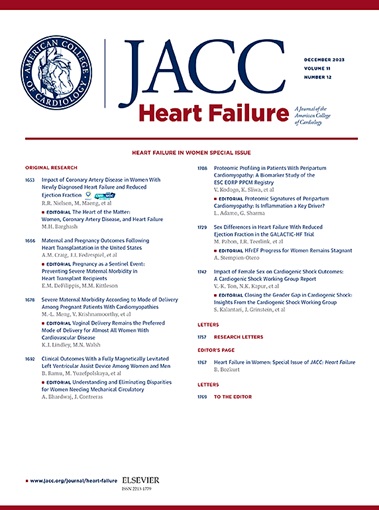心脏缺氧的争议与难题:心力衰竭患者消瘦的关键问题。
IF 10.3
1区 医学
Q1 CARDIAC & CARDIOVASCULAR SYSTEMS
引用次数: 0
摘要
心脏恶病质的特点是无意识的分解性体重减轻、食欲下降和炎症,常见于射血分数降低的 D 期(晚期)心力衰竭(HFrEF)患者。心脏恶病质和相关的肌肉萎缩综合征是心力衰竭(HF)综合征的标志和后果。虽然有许多潜在的方法可以识别心脏恶病质,但心脏恶病质的最佳定义、诊断工具和治疗方案仍不明确。此外,在进行左心室辅助装置和心脏移植等晚期高频手术之前尝试逆转肌肉萎缩是否能改善预后,目前仍不清楚。心房颤动临床医生和营养师必须了解心房颤动患者肌肉萎缩综合征的病理生理学和机制,以帮助识别晚期 HFrEF 并进行风险分层。虽然在晚期 HF 手术前尝试解决心脏恶病质的机会和理由尚不确定,但最近的出版物表明,控制晚期 HF 的神经体液综合征对于恢复骨骼肌质量可能非常重要。本文章由计算机程序翻译,如有差异,请以英文原文为准。
Controversies and Conundrums in Cardiac Cachexia
Cardiac cachexia is characterized by unintentional catabolic weight loss, decreased appetite, and inflammation and is common in patients with stage D (advanced) heart failure with reduced ejection fraction (HFrEF). Cardiac cachexia and related muscle-wasting syndromes are markers of, and a consequence of, the heart failure (HF) syndrome. Although many potential modalities for identifying cardiac cachexia exist, the optimal definition, diagnostic tools, and treatment options for cardiac cachexia remain unclear. Furthermore, it remains unclear whether attempts to reverse muscle wasting prior to advanced HF surgeries, such as left ventricular assist devices and heart transplantation, can improve outcomes. It is important that HF clinicians and dietitians are aware of the pathophysiology and mechanisms of muscle-wasting syndromes in patients with HF, to aid in the recognition and risk stratification of advanced HFrEF. Although the opportunities and rationale for attempting to address cardiac cachexia prior to advanced HF surgeries are uncertain, recent publications suggest that control of the neurohumoral syndrome of advanced HF may be important to permit the recovery of skeletal muscle mass.
求助全文
通过发布文献求助,成功后即可免费获取论文全文。
去求助
来源期刊

JACC. Heart failure
CARDIAC & CARDIOVASCULAR SYSTEMS-
CiteScore
21.20
自引率
2.30%
发文量
164
期刊介绍:
JACC: Heart Failure publishes crucial findings on the pathophysiology, diagnosis, treatment, and care of heart failure patients. The goal is to enhance understanding through timely scientific communication on disease, clinical trials, outcomes, and therapeutic advances. The Journal fosters interdisciplinary connections with neuroscience, pulmonary medicine, nephrology, electrophysiology, and surgery related to heart failure. It also covers articles on pharmacogenetics, biomarkers, and metabolomics.
 求助内容:
求助内容: 应助结果提醒方式:
应助结果提醒方式:


